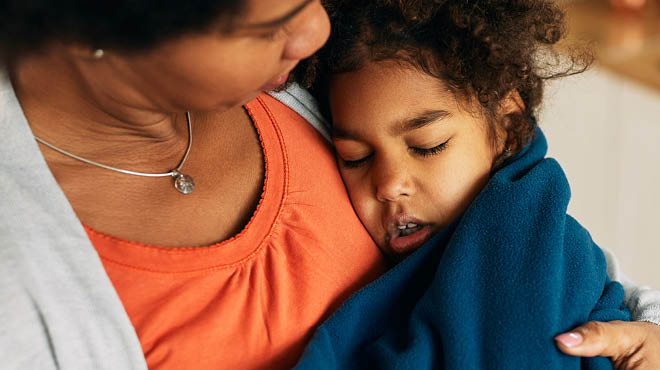Recent Posts
Bronchiolitis in children: Understanding cause, symptoms, concerns

As a pediatrician, I see many illnesses, and as a mother, I have had sleepless nights with small children battling illness. The most common culprit? A lower respiratory viral infection called bronchiolitis.
Bronchiolitis affects the small airways and commonly causes nasal congestion and discharge, coughing and, sometimes, wheezing in young children. All children are susceptible to bronchiolitis. Many viruses can cause bronchiolitis. The most common is respiratory syncytial virus, or RSV.
If your baby was premature, has heart or lung disease or is younger than 4 months old, they are at a higher risk of acquiring this illness.
Bronchiolitis affects children in multiple ways.
Fever
Your child may or may not have a fever with this illness. Call your child's healthcare team if:
- Your child is under 6 months of age and has a temperature greater than 100.4 F.
- Your child is over 6 months old and has a temperature greater than 102.2 F.
- Your child has a temperature of 100.4 F or greater for more than five days.
- Your child has not received early childhood vaccinations and is age 2 or under.
The American Academy of Pediatrics recommends obtaining rectal temperatures in children 3 months old or less. Contact your child's healthcare team or seek care immediately if your child is 2 months old or younger and has a rectal temperature of 100.4 F or greater because it could be an emergency.
Changes in breathing
With breathing difficulties, your child may look like they are sucking in their neck and rib muscles, or their breathing may be faster than usual. Infants, especially newborns and those less than 4 months old, can have long pauses in their breathing or stop breathing.
Babies normally breathe through their noses. When their nasal cavities are congested, they can't breathe through their nose and often have difficulty eating. This can lead to poor feeding, which can contribute to dehydration and inability to sleep. Although it may be difficult for infants to sleep with nasal congestion and coughing, the ABCs of sleep are still strongly recommended. Always put your infant to sleep alone on their back in a crib with a flat, firm surface and away from smoke exposure.
If your child is having any of these symptoms, they need to be evaluated by their healthcare team.
Dehydration in babies
Infants and children are especially vulnerable to dehydration. If your child has less than one wet diaper every six hours or has a significant change in the number of wet diapers, it could be an indication of dehydration. Infants up to 12 months should only receive breast milk, formula or a children's electrolyte drink to help with hydration.
Changes in skin color or tone
Especially for newborns, younger infants and preterm infants, viruses can cause changes in skin color or tone. If your child starts to change color or tone, watch them carefully. Contact their healthcare team if they begin looking blue or pale, or appear limp or flaccid.
Children of all ages commonly get six to eight colds in a year. This happens even to children with healthy immune systems simply because they are exposed to new illnesses.
Here's what you can do:
- Use a cool mist vaporizer to help decrease nasal congestion. Run it for 30 minutes with the bedroom door shut before nap time, bedtime and throughout the night.
- Bulb suctioning with nasal saline two to three times a day dramatically helps reduce nasal congestion and allows infants to eat and sleep better. Don't be alarmed if you see a little blood-tinged mucus when doing this. This virus causes irritation that can cause bleeding.
- For children less than 12 months, have a prepackaged electrolyte drink like Pedialyte on hand. For children older than 12 months, hydrate with water or an electrolyte drink.
- For infants at high risk of serious illness from RSV, talk to their healthcare team about RSV vaccination.
For some, bronchiolitis will come and go without severe symptoms. For others, that won't be the case. Parents should become familiar with the symptoms so they know the signs to watch for. If you have any questions, contact your child's healthcare team.
Christina Andrist, D.O., is a pediatrician in Albert Lea, Minnesota.





